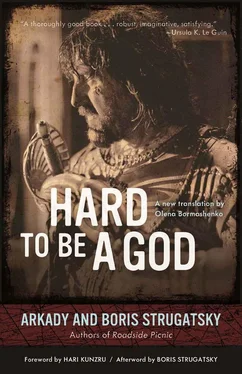I didn’t listen any further. I broke out in a cold sweat. Everyone sat there, still as death, staring at the table, no one was making a sound, and that’s when I realized that for the first time in my life I was faced with His Majesty the Avenging Idiot, with what had happened in 1937 and 1949. Should I protest? And what if they don’t support me? How do I know what they have up their sleeve? And what if this had already been approved and agreed upon? A terrible cowardice seized me, and it wasn’t for no reason; I was also afraid for you. And then I got so enraged that the cowardice vanished. And when Kazantsev finished, I yelled, “Allow me!” Tushkan, looking at me with displeasure, said, “Now, now, go on then.” “With all due respect to Alexander Petrovich, I strongly protest. It’s possible to like Altov or not to like Altov. I don’t like him that much myself, but think about what you’re saying. Altov—a fascist! That’s a label, this is being recorded in shorthand, we’re not sitting in a pub, this is God knows what, this is simply indecent!” (I remember this much, but I then kept babbling for another five minutes or so.)
A second of dead silence. Then Tolya Dneprov’s steely voice: “For my part, I must state that I haven’t heard Altov accusing me of a predilection for the subject of the struggle between two worlds. He accused me of having characters that are not people, but ideas and machines.” Kim: “And he’s no abstractionist. On the contrary, when he visited me and saw so and so’s picture, he criticized it severely.”
Then everyone started clamoring, talking, Kazantsev began to explain what he wanted to say, and I was shaking with anger and couldn’t hear anything else. And when it was all over, I got up, cursed (using strong language, I think), and told Golubev, “Let’s leave this place, they are handing out labels.” I said it loudly. We went downstairs to the pub, and guzzled down a bottle of some liqueur.
So now it seemed like absolutely everyone got what was coming to them.
However, no one was arrested. No one was even kicked out of the Writers’ Union. Moreover, in the midst of the purulent stream we were even allowed to put together two or three articles containing careful objections and an outline of our (and not the party’s) point of view. These objections were immediately trampled and crushed, but the fact of their appearance already meant that the authorities were not aiming to kill.
And already, the reigning Soviet playwright Anatoly Sofronov (a real piece of work, I’m sorry to say), was arrogantly soothing the frightened: “Some are now expressing concerns: that there might be excesses, that someone might be ‘suppressed,’ etc. Don’t worry, they won’t ‘suppress’ us, no need to fear. Our Soviet regime is kind, our party is kind and humane. We must do honest, good work, then everything will be all right.”
But we weren’t as much afraid as disgusted. Everything felt vile and repulsive, like rotten meat. No one really knew what had caused this rapid return to the abscess. It was possible that the authorities were upset about the very recent painful flick on the nose they had received during the Cuban Missile Crisis and were taking out their anger on their own people. It was possible that the agricultural situation had deteriorated even further, and shortages of bread were already being predicted for the near future (they did occur in 1963). It was possible that it was simply the time to show the swollen-headed “intelligoosia” who’s the master of this house and who he stands with—not your Ehrenburgs, not your Ernst Neizvestnys, not your suspicious Nekrasovs—but with the good old guard, tried and true, long since bought, cowed, and reliable.
One could pick any of these versions or all of them at once. But one thing became, as they say, painfully clear. We shouldn’t have illusions. We shouldn’t have hopes for a brighter future. We were being governed by goons and enemies of culture. They will never be with us. They will always be against us. They will never let us say what we believe is right, because what they believe is right is something completely different. And if for us communism is a world of freedom and creativity, for them communism is a society where the people immediately and with pleasure perform all the prescriptions of the party and government.
The realization of these simple—although then far from obvious for us—truths was painful, like the realization of any truth, but beneficial at the same time. New ideas appeared and strongly demanded their immediate implementation. The “fun story in the spirit of The Three Musketeers” that we had thought up began to appear in an entirely different light, and I didn’t need long speeches to convince Arkady that they needed to make a substantial ideological adjustment in The Observer. The time of “light things,” the time of “swords and cardinals” seemed to have passed. Or maybe it simply hadn’t come yet. The adventure story had to, was obliged to, become a story about the fate of the intelligentsia, submerged in the twilight of the Middle Ages.
From Arkady’s journal:
…12–16 (April 1963) was in Leningrad…. Made a decent sketch of The Observer (formerly Seventh Heaven) …
08/13/1963— …Wrote Hard to Be a God in June. Now hesitating, unsure what to do with it. Detgiz won’t take it. Maybe we should try Novy Mir?
We never did try Novy Mir, but we did try the thick journal Moskva. To no avail. The manuscript was returned with a condescendingly negative review—apparently Moskva didn’t print science fiction.
In general, the novel inspired contradictory reactions from the reading public. Our editors were especially puzzled. Everything in this novel was unusual to them, and a lot of requests (quite friendly, by the way, and not at all meanly critical) were made. On the advice of I. A. Efremov, we renamed the Minister of the Defense of the Crown Don Reba (he had previously been Don Rebia—an overly simple anagram, in the opinion of Ivan Antonovich.) Moreover, we had to do a lot of work on the text and add an entire big scene where Arata the Hunchback demands lightning from the hero and doesn’t receive it.
It’s amazing that this novel went through all the hurdles of censorship without any particular difficulties. Either the liberalism of the then-leaders of the Young Guard played a role, or the careful maneuvers of our wonderful editor, Bela Grigorevna Klyueva, or maybe it was actually just that there was a certain retreat after the recent ideological hysteria—our enemies were catching their breath and complacently looking around the newly captured lands and beachheads.
Although on the book’s release, a reaction of a certain sort followed immediately. This might have been the first time that the Strugatskys were attacked by the big guns. The academic of the Academy of Sciences of the USSR Y. Frantsev accused the authors of abstractionism and surrealism, while his venerable fellow writer V. Nemtsov accused us of pornography. Fortunately, that was still a time when it was permissible to respond to the attacks, and I. Efremov stood up for us in his brilliant article “Billions of Facets of the Future.” And the political temperature outside had by then gone down. In short, nothing happened. (The ideological mutts would still occasionally bark at this novel from their yards, but then we got around to publishing Tale of the Troika, The Final Circle of Paradise, The Snail on the Slope— and against that background, the novel Hard to Be a God, to the surprise of the authors, even became a work to emulate. The Strugatskys were already being scolded: what’s this, look at Hard to Be a God —you know what to do when you feel like it, why don’t you keep working in that vein?)
Читать дальше












